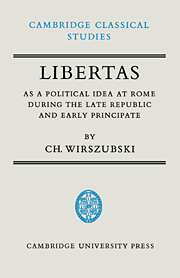Book contents
- Frontmatter
- Contents
- PROLEGOMENA
- CHAPTER 1 GENERAL CHARACTERISTICS OF LIBERTAS
- CHAPTER 2 CIVIL DISCORD: OPTIMATES AND POPULARES
- CHAPTER 3 THE DECLINE OF THE TRADITIONAL FORM OF GOVERNMENT
- CHAPTER 4 THE AUGUSTAN PRINCIPATE IN RELATION TO LIBERTAS
- CHAPTER 5 PRINCIPATUS ET LIBERTAS RES OLIM DISSOCIABILES
- Bibliography of works referred to
- Index
CHAPTER 1 - GENERAL CHARACTERISTICS OF LIBERTAS
Published online by Cambridge University Press: 24 August 2009
- Frontmatter
- Contents
- PROLEGOMENA
- CHAPTER 1 GENERAL CHARACTERISTICS OF LIBERTAS
- CHAPTER 2 CIVIL DISCORD: OPTIMATES AND POPULARES
- CHAPTER 3 THE DECLINE OF THE TRADITIONAL FORM OF GOVERNMENT
- CHAPTER 4 THE AUGUSTAN PRINCIPATE IN RELATION TO LIBERTAS
- CHAPTER 5 PRINCIPATUS ET LIBERTAS RES OLIM DISSOCIABILES
- Bibliography of works referred to
- Index
Summary
LIBERTAS—LEGES
As has been seen, libertas at Rome and with regard to Romans is not an innate faculty or right of man, but the sum of civic rights granted by the laws of Rome; it consequently rests on those positive laws which determine its scope. This fundamental idea implies that libertas contains the notion of restraint which is inherent in every law. In fact, it is the notion of restraint and moderation that distinguishes libertas from licentia, whose salient feature is arbitrariness; and libertas untempered by moderation degenerates into licentia. True libertas, therefore, is by no means the unqualified power to do whatever one likes; such power—whether conceded or assumed—is licentia, not libertas. The necessary prerequisite of libertas is the renouncement of self-willed actions; consequently, genuine libertas can be enjoyed under the law only.
There is profound truth in Cicero's saying, “legum idcirco omnes servi sumus ut liberi esse possimus”. For were it not for the restrictions imposed by law, everyone would be free to do always as he liked, and that would result—to use Hobbes' phrase—in a “bellum omnium contra omnes”, that is to say, it would result, not in the enjoyment of complete freedom, but in its self-destruction through excess. Fools, observed Tacitus, identified licentia with libertas.
The element of restraint inherent in libertas is not necessarily, nor primarily, self-restraint; it is not, nor expected to be, solely the result of sophrosyne which voluntarily follows the maxim “nothing to excess”.
- Type
- Chapter
- Information
- Publisher: Cambridge University PressPrint publication year: 1950
- 2
- Cited by



